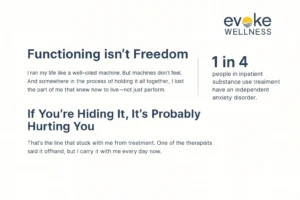I didn’t crash my car. I didn’t lose my job. There was no big, dramatic moment. Just a morning like any other—except I couldn’t stop shaking. Not visibly, not in a way anyone would notice. But something inside me had finally started to slip. And for once, I couldn’t fake it.
From the outside, I looked fine. I always had. I worked hard. I got things done. I remembered birthdays and crushed presentations and kept my sarcasm just sharp enough to stay likable. What no one saw was how much of my life was powered by substances—and the fear that without them, everything would fall apart.
When I finally admitted myself into dual diagnosis treatment at Evoke Wellness in Cohasset, MA, I wasn’t even sure what I was asking for. I just knew I was done lying. Mostly to myself.
Functioning Isn’t Freedom
I ran my life like a well-oiled machine. But machines don’t feel. And somewhere in the process of holding it all together, I lost the part of me that knew how to live—not just perform.
I wasn’t drinking to party. I was drinking to sleep. To tolerate social interactions. To survive meetings. To quiet the thoughts that kept circling like buzzards. I knew the term “high-functioning alcoholic,” but it didn’t feel like it applied to me. I was just… managing. I thought that made me strong.
But dual diagnosis treatment reframed that completely. What I saw as strength was actually exhaustion. What I thought was control was actually fear—fear of being found out, of unraveling, of not being able to survive what came up if I stopped using.
The Truth Was Underneath the Surface
My real problem wasn’t alcohol.
It was the why behind it.
Why did I need something to feel okay in my own skin? Why did I panic when I didn’t have access to it? Why did I keep telling myself, “It’s not that bad,” even while crying in the shower at 2 a.m.?
The answer came slowly in treatment: I had unaddressed anxiety, depression, and perfectionism so deeply wired into my nervous system, I couldn’t tell the difference between “being productive” and being in fight-or-flight mode all day.
Substances weren’t the issue—they were the strategy. The real problem was the mental health struggle I never allowed myself to name.
The Stories I Told Myself
I thought people in treatment had DUIs or lived on the streets. I told myself that I didn’t need help because I had a good job, because I wasn’t using every day, because I still “had things under control.”
But the truth? I had rules. Rules that let me pretend I wasn’t spiraling.
- Never drink before 5 p.m.
- Only use on weekends.
- No more than two drinks at work events.
- Only Xanax if I’m flying.
These rules didn’t protect me. They camouflaged the chaos. I wasn’t in control. I was strategizing around dependence.
Dual diagnosis treatment helped me name what was really happening—and gave me the first honest space to stop hiding.
Dual Diagnosis Treatment Gave Me Language I Didn’t Know I Needed
I didn’t walk into treatment ready to spill everything. In fact, I barely spoke in the first few groups. But slowly, I started hearing pieces of myself in other people’s stories. People who, like me, looked “fine” on paper but were quietly drowning inside.
The power of dual diagnosis treatment is that it doesn’t force you to choose between addiction help and mental health care. It acknowledges that the two are braided together.
In my case, the anxiety came first. Then the drinking. Then the shame. Then the cycle. Until I couldn’t remember which came first—only that I couldn’t separate them anymore.
That’s the thing dual diagnosis treatment taught me: it’s not always about how much you use—it’s about why you can’t stop.
The Wake-Up Call Was Quiet
It wasn’t an intervention or an overdose.
It was me, in a pharmacy parking lot, trying to figure out if I could make it through a meeting without drinking, and realizing I didn’t want to find out.
That moment was quiet. But it changed everything.
I called a friend who had gone through Evoke Wellness a year prior. She didn’t shame me. She just said, “You don’t have to keep doing this.” And for the first time in years, I believed her.
What Treatment Actually Looked Like (Spoiler: It Wasn’t a Horror Movie)
I expected sterile rooms and judgmental counselors. What I found was gentleness. Honesty. People who didn’t care about my resume—but cared deeply about my pain.
Treatment at Evoke Wellness wasn’t about stripping me down to nothing. It was about helping me reconnect to who I was before I started hiding. Before the coping mechanisms took over.
There were therapy groups. Individual sessions. Psych assessments. Yes, I was diagnosed officially—for the first time—with generalized anxiety disorder and persistent depressive disorder. And no, it didn’t make me feel broken. It made me feel seen.
I wasn’t lazy or dramatic or weak. I was trying to survive with an untreated mental health condition. And now? I had help.
If You’re Hiding It, It’s Probably Hurting You
That’s the line that stuck with me from treatment. One of the therapists said it offhand, but I carry it with me every day now.
If you’re hiding something—your drinking, your panic, your need to escape—it’s probably not serving you.
You don’t have to fall apart to qualify for support. You don’t have to explain your pain in a way that makes it obvious to others. If it’s hurting you, that’s enough.
And if it’s tangled up in both mental health and substance use, you don’t have to untangle it alone. That’s exactly what dual diagnosis treatment is for.
FAQs About Dual Diagnosis Treatment
What is dual diagnosis treatment?
Dual diagnosis treatment is a specialized approach for people who experience both substance use disorders and mental health conditions at the same time. Instead of treating just one issue, this approach addresses both—because one often fuels the other.
How do I know if I need dual diagnosis treatment?
If you’ve ever used substances to cope with mental health symptoms—like anxiety, depression, trauma, or intrusive thoughts—you might benefit. Signs include:
- You feel emotionally unstable even when you’re not using
- You use to manage moods or function “normally”
- Quitting substances makes your mental health feel worse
- You’ve tried therapy or sobriety alone and felt something was missing
Is dual diagnosis treatment only for severe cases?
Not at all. Many high-functioning individuals—those with careers, families, and active lives—seek dual diagnosis treatment when they realize their inner world isn’t matching the outside. You don’t have to “hit bottom” to qualify.
What makes Evoke Wellness different?
Evoke Wellness in Cohasset, MA, specializes in integrated care. Their clinicians are trained to recognize how substance use and mental health affect each other, and they build individualized plans that honor both challenges. Whether you’re dealing with trauma, anxiety, bipolar disorder, or depression, Evoke helps you address the root—not just the symptoms.
Will I have to stop everything in my life to get help?
There are multiple levels of care—from residential to outpatient—so treatment can be tailored to your life. What matters most is finding a plan that works and works for you. The first step is talking to someone who can help you explore your options.
You don’t have to keep performing wellness.
Call 866-931-6429 to learn more about our Dual Diagnosis Treatment services in Cohasset, MA. Let’s help you find rest—not just relief.





